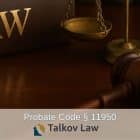Forcing the Sale after the Death of a Co-Owner Without Probate
Californians with a deceased co-owner can force the sale of the property without going through probate by filing a partition action. In California, the court can proceed with the partition by joining the deceased co-owner’s representative or successor, or simply their estate if their is no representative. This ensures that the property can be sold … Read More





![What to Do When a Co-Owner Dies in a Partition Action [Form Template Example - Code of Civil Procedure 872.530(b)] Affidavit re Death of Co-Owner.jpg](https://talkovlaw.com/wp-content/uploads/What-do-Do-When-a-Co-Owner-Dies-in-a-Partition-Action-Form-Template-Example-Code-of-Civil-Procedure-872.530b-Affidavit-re-Death-of-Co-Owner.jpg)








































































































































